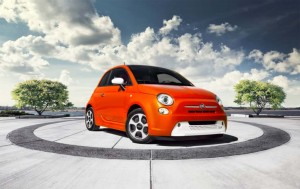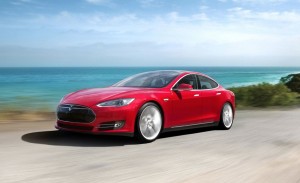
Each Fiat 500e sold costs Fiat Chrysler $14,000, making the little EV possibly CEO Sergio Marchionne's least favorite vehicle.
One of the gaps in the FCA product line-up is a shortage of hybrid or electric vehicles. However, the company does have one available – the new Fiat 500e – whether CEO Sergio Marchionne likes it or not.
The charismatic leader of the newly merged companies has never been a big fan of hybrids or EVs in large measure because, well, they’re not profitable. In fact, the new 500e is going to cost FCA more than $10k each time one rolls out of the showroom.
Viscerally opposed to losing money, Marchionne actually appeared to be campaigning against his own product recently. He may not be alone. There are several manufacturers that are less than enthusiastic about their entries into the small, but growing market for electrified vehicles.

Tesla's Model S is one of the best-selling electric vehicles in the U.S., making it tough for the Fiat 500e to make any headway in the segment.
“If you are considering buying a 500e I hope you don’t buy it, because every time I sell one it costs me $14,000,” he said at appearance in Washington D.C. at the Brookings Institution.
That’s at least $4,000 more than the hit the company originally expected to take. The Fiat 500e starts at $32,300, but the price can drop to below $20,000 when tax credits and other incentives are included.
Chrysler and its Italian partner, Fiat, have been among the slowest of the major manufacturers when it comes to embracing electrification. Though the U.S. side of the company showed off a number of battery-based concepts prior to its bankruptcy in 2009. All were scrapped when Marchionne took control of the company. Fiat hasn’t gone any further…until now.
Going forward, Fiat Chrysler Automobiles may have no choice. Like other major automakers, the company is subject to the new Zero-Emission Vehicles, or ZEV, mandate enacted by California regulators. Without an full battery-electric vehicle, or some equivalent, Chrysler won’t be able to sell any cars in the Golden State, the single-largest automotive market in the U.S.
So, for now, FCA is testing the waters. The Fiat 500e is the only EV is the only pure battery electric vehicle in the company’s line-up. At the recent day-long analyst and media event at the company’s campus in Auburn Hills, Michigan, Marchionne noted other green vehicles would be coming in the near future, specifically a Chrysler Town & Country plug-in hybrid that would get more than 70 mpg. It’s not expected until after 2016 – and since it won’t run on batteries alone, it won’t be enough to meet the ZEV-mandate anyway.
(Toyota makes it three recalls in one day. For more, Click Here.)
The question is whether the 500e is more than a so-called “compliance car,” marketed solely to satisfy California regulators, without truly meeting consumer needs. It suffers from many of the same problems as other current battery-electric vehicles. Competing with the Nissan Leaf and Ford Focus Electric, the Fiat 500e develops a modest 111 hp and has a limited range of only 87 miles on a charge.
Limited range, long charging times and high prices are among the reasons why EVs account for less than 2% of all new-car sales in the U.S., say industry analysts. Automakers sold approximately 15,000 electric vehicles during the first four months of this year, according to the Electric Drive Transportation Association, up about 9% compared to the same period in 2013.
(Click Herefor details about GM reviving the seatbelt interlock.)
The Tesla Model S and the Nissan Leaf are currently the best sellers, but there is a growing list of new entries, including the Ford Focus Electric, Mitsubishi i-MiEV, Toyota RAV4-EV, Fiat 500e. Marchionne isn’t the only one who’d rather not be in the battery car market. Despite the fact that its Prius is the world’s best-selling hybrid, Toyota has been openly and vocally negative about battery power, especially more advanced lithium-ion batteries. The Japanese maker went so far as to run a recent ad questioning the environmental benefits of battery vehicles.
(To see why Chrysler hired outside consultants to review its recalls, Click Here.)
And as TheDetroitBureau.com reported, Toyota will soon kill off the RAV4-EV – which it developed as part of a joint venture with Tesla – it will instead try to meet the California ZEV-mandate with a new hydrogen fuel cell vehicle that will come to market next year.
Toyota isn’t alone. Honda and Hyundai also are entering the hydrogen market, the first of the Korean maker’s Tucson fuel cell vehicles just starting to reach dealers in Southern California. Hydrogen advocates contend that the technology could become more appealing to consumers than electric vehicles in the years ahead.

All I can say is, I love my 2012 Leaf!!
I will never go back to a gas car again!